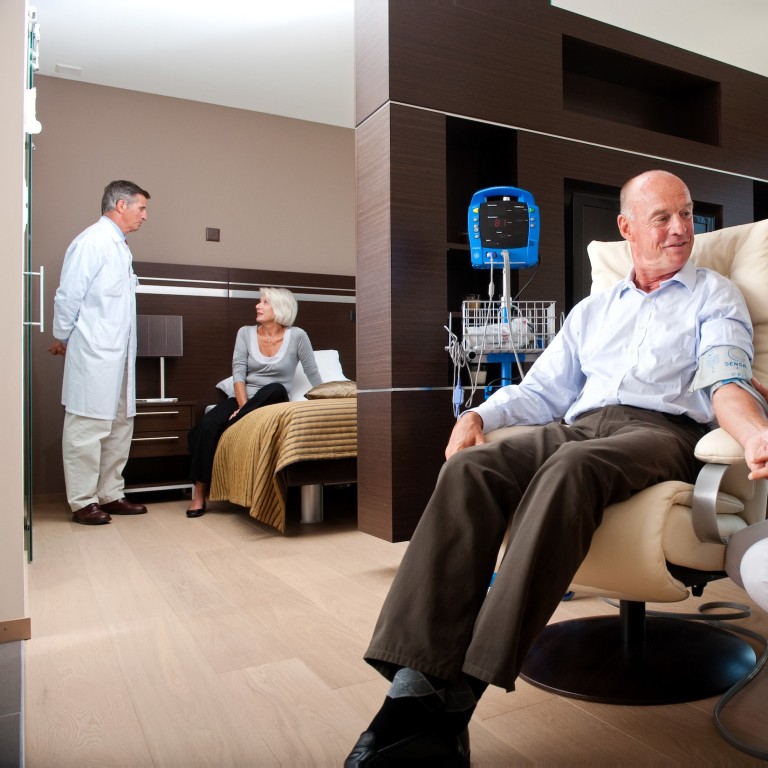
Expert health care is a magnet for medical tourists
- Medical programmes that were once the preserve of Hollywood actors, pop stars and celebrities are available to everyone
Switzerland is known as the lands of chocolate, cheese and perfect scenes of peaks that appear to come straight out of a postcard. But a rising phenomenon of interest in health has seen the country’s medical tourism industry grow exponentially.
Medical programmes and well-being offerings that once were the preserve of Hollywood actors, pop stars and celebrities are now coming to an open market of tourists.
At the heart of this concept are countries such as India, South Korea and Thailand. But Europe has an advantage with its history as a leader in cutting edge medical technology and providers of expert health care.
The phenomenon means tourists from Russia, the Middle East and China are arriving in increasing frequency. While there is a wide range of services available, a number are focused on preventive medicine and anti-ageing, hot areas in health care.

“The medical care here in Switzerland is one of the best in the world with its high quality, cutting edge infrastructure and a wide range of advanced treatments and procedures,” says Dr Jacques Proust, medical director at Nescens Preventive Medicine Center – Genolier, and founder of the Nescens brand.

The clinic has 150 doctors and specialists, and is connected to a countrywide network of 1,250 doctors and specialists all over Switzerland. The Nescens brand encompasses 18 clinics in Switzerland, not to mention spas located in Geneva and Interlaken.
Nescens Clinique de Genolier has always been a destination for many affluent Chinese
But Nescens Clinique de Genolier began with much humbler origins: the concept of blending relaxation, tourism and well being is the brainchild of Proust – pioneer in the biology of ageing and anti-ageing medicine.
Proust shares his more than 25 years of expertise with patients, and has developed highly specialised programmes that are focused on patients’ specific needs. Targeted areas can range from lung function, to tumour and oncology check-ups to men’s health issues such as erectile dysfunction and urinary disorders.
In preventive medicine, a central goal is to fight arterial hypertension, diabetes, cancer, degenerative diseases and ageing-associated diseases such as Alzheimer’s disease.
Another major area is aesthetic medicine, examining the alleviation of scars, wrinkles, moles and liver spots, reduction of excess fat, elimination of cellulite, and other features considered by some to be unattractive.
Versatility is the name of the game; attached to the Nescens Clinique de Genolier is a centre dedicated to physiotherapy and sport coaching, while stem cell research is a focus and dental care is among the list of specialities.
Although some may see Nescens Clinique de Genolier as a centre of medical tourism, what sets it apart are residences that provide five-star hotel services, spas, world-leading gastronomic cuisine and everything one might expect from a regular holiday.
“Medical spas and wellness resorts, which offer a healthy living experience, involving mineral baths, massage and all kinds of relaxation and beauty therapies attract clients from all walks of life,” says Proust.
The goal is largely holistic, and aimed at detecting diseases at an early stage, identifying some of the health risk factors, looking at lifestyle habits, managing age-related changes and diseases, and implementing a personalised preventive health plan. Through this lens, anti-ageing and beauty are the goals, and, of course, robust health.
This 360-degree approach to health is a concept growing in interest internationally. KPMG research from 2018 estimated the global medical tourism industry to reach US$32.5 billion by this year.
As with many other tourism-driven industries, Chinese people travelling for health reasons are boosting growth of the sector.
The Switzerland Travel Centre recorded an increase in bookings to Switzerland by more than 15 per cent within the first half of 2018. Chinese individual tourism in Switzerland is booming and according to current forecasts, the trend is here to stay.
“Nescens Clinique de Genolier has always been a destination for many affluent Chinese,” says Proust, adding that he has seen a notable increase in the number of patients in recent years.
The Nescens founder says some of the most sought after procedures include stem cell-based anti-ageing programmes. “Nescens Clinique de Genolier is the leading provider of stem cell treatments in Switzerland and highly regarded worldwide in the field of anti-ageing and age management.”
The clinic is an official partner of Swiss Stem Cell Foundation, the Swiss Agency for Therapeutic Products, responsible for processing and storing stem cells. “Our physicians are highly experienced in the extraction and reinjection of stem cells,” says Proust.
